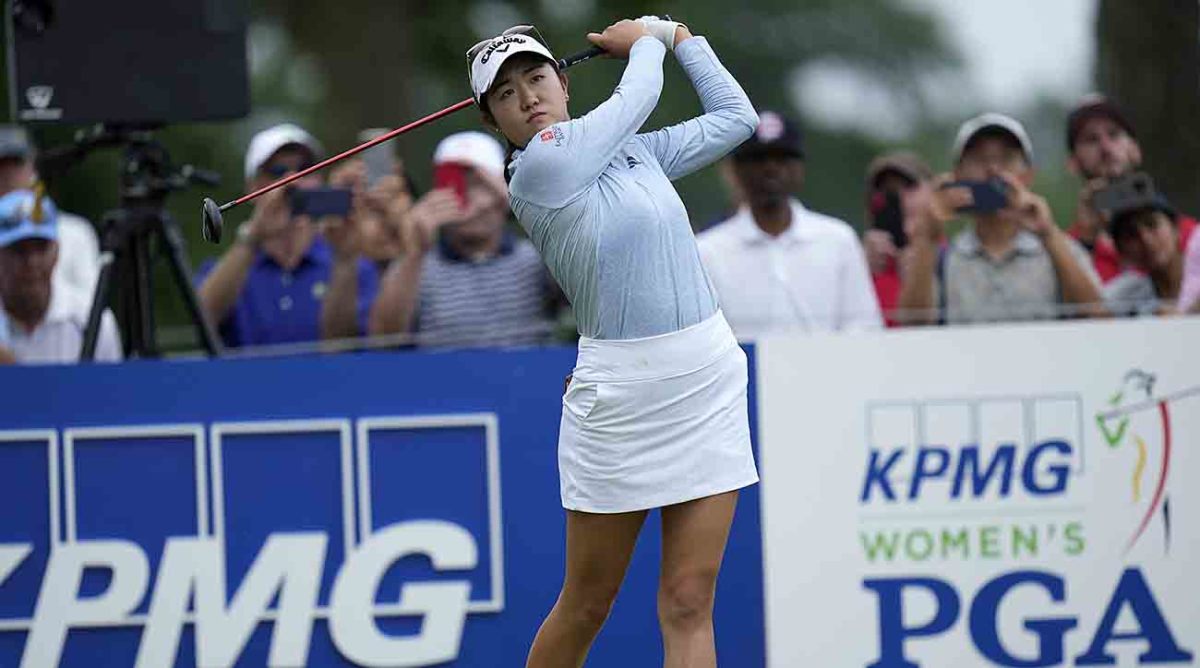As the LPGA Surges With Rose Zhang, Saudi Arabia's PIF Could Help Itself by Forging a Partnership

SPRINGFIELD, N.J. — When play resumed on Sunday at 2:55 p.m. ET on Baltusrol’s Lower Course after a two-hour rain delay during the final round of the KPMG Women’s PGA Championship, I rushed out to the A.W. Tillinghast-designed masterpiece to find the Rose Zhang group. The 20-year-old rookie sensation had leaped into contention with five birdies in her first 11 holes to draw within a shot of the lead after starting the day six shots back of the third-round leader, Leona Maguire. A crowd that felt dispersed across the sprawling Lower Course converged on Zhang’s group, which included Mina Harigae and Xiyu Lin. In the end, after a 4-under-par 67, Zhang would finish in a tie for eighth, three shots back of the winner, Ruoning Yin, but she was the star attraction of the tournament.
Perhaps not since a 15-year-old Michelle Wie turned pro in 2005 has there been an American player with so much buzz as Zhang, who plans to continue her Stanford education while playing the LPGA Tour. The Irvine, Calif., native is an unassuming star: so modest that she said that her goals coming into the KPMG were to make the cut. She had said the same thing earlier this month prior to winning the Mizuho Americas Open in her pro debut.
In less than a month on the professional golf scene, Zhang has placed a spotlight on the women’s game and the LPGA Tour as the PGA Tour considers a new relationship with the Public Investment Fund (PIF), the Saudi Arabia sovereign wealth fund that is backing LIV Golf. Since its inception in 1950, the LPGA Tour has operated in the shadow of the men’s game and the economic and popularity disparities between the two organizations are certain to widen with the infusion of PIF money.

In this debate about LIV Golf, much has been said about the government-sanctioned discrimination of women in Saudi Arabia, where they live under a male guardianship system that controls most aspects of their daily lives from marriage to their right to a divorce to the custody of their children. There have been reforms in recent years, but Saudi Arabian women still do not have equal rights with men in their country. Yet in March, FIFA reversed its sponsorship with the Saudi Arabia state tourism authority, citing human rights abuses in the country that run counter to its mission.
At the PIF, women are integral to the nation’s Vision 2030 plan, which is designed to lessen the country’s dependence on oil, diversify the economy and empower women to lead their best lives. Vision 2030’s plan to empower women is in sync with the mission of the LPGA Tour. Over the past week at Baltusrol, KPMG’s sponsorship of the Women’s PGA was a display of the power and potential of women on and off the golf course. What if the PIF used its $700 billion fund to extend its work for women through support of the LPGA Tour? What better place than the oldest women’s professional sports organization in the United States to demonstrate the concerns with equity and fairness for women across the globe?
Women’s sports know something about allegedly taking so-called “blood money” to further its goals and ambitions. In 1990, Louis Sullivan, who was the Secretary of Health and Human Services in the President George H. W. Bush’s administration, criticized women’s tennis for taking sponsorship from the tobacco giant Phillip Morris, which marketed its Virginia Slims brand to women.
Virginia Slims was synonymous with women’s tennis for decades. Many players were conflicted about their support of an organization that sold products that killed people, but they couldn’t deny the impact that the tobacco industry had on the growth of their sport in the immediate years after Title IX, which was enacted in 1972 to grant equity for women in sports.
It’s Title IX that gave so many women an opportunity to play college athletics, including golf. At Stanford, Zhang won back-to-back individual national championships. Her world is one inextricably shaped by the advances of women across society from business to sports to science and medicine. The PIF has the resources to make the same kind of impact as Title IX on women’s golf.
Perhaps more than anything, the PIF and its governor Yasir Al-Rumayyan want in their proposed investment in the PGA Tour is validation and a place within the grand traditions of golf, which represent important symbols of wealth and power across the United States and the globe. At Baltusrol, you had a global field of the best players in the world on one of the most iconic and famous courses in the world. There was a global firm in KPMG demonstrating value for both women and golf. There was Zhang, who will lead a new generation of players on an LPGA Tour certain to make more money and play better courses than their predecessors.
The LPGA Tour is positioned as a women’s organization to challenge the PIF on both its human rights record and the reforms that it supports for women. During the Civil Rights movement, it wasn’t enough for Dr. Martin Luther King, Jr. and others to boycott stores that wouldn’t serve Black patrons or change laws through the courts that sanctioned violence and inequality against a group of people based on the color of their skin. These leaders fought for change so that their children could live in a free and integrated society for all people.
Ultimately, the work that the PGA Tour, the LPGA Tour and the PIF could potentially do together will not only make the game of golf better for future generations, it could make the world a better place for women and nurture more space for healthy dialogue around our disagreements.
